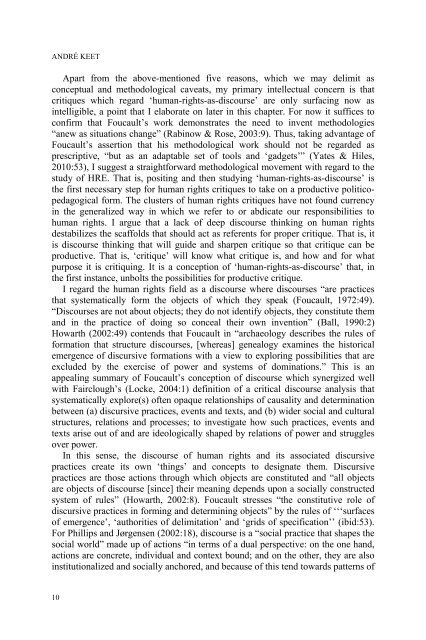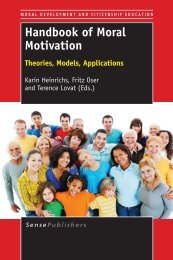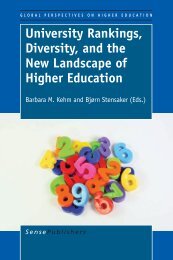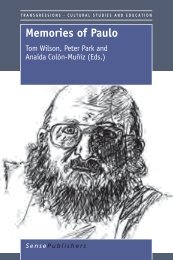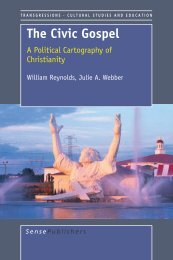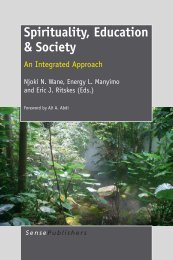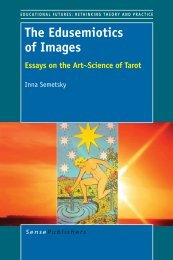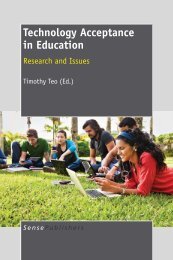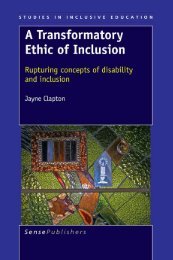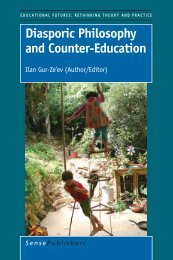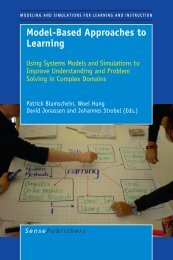Safe Spaces Human Rights Education in Diverse Contexts
Safe Spaces Human Rights Education in Diverse Contexts
Safe Spaces Human Rights Education in Diverse Contexts
You also want an ePaper? Increase the reach of your titles
YUMPU automatically turns print PDFs into web optimized ePapers that Google loves.
ANDRÉ KEET<br />
Apart from the above-mentioned five reasons, which we may delimit as<br />
conceptual and methodological caveats, my primary <strong>in</strong>tellectual concern is that<br />
critiques which regard ‘human-rights-as-discourse’ are only surfac<strong>in</strong>g now as<br />
<strong>in</strong>telligible, a po<strong>in</strong>t that I elaborate on later <strong>in</strong> this chapter. For now it suffices to<br />
confirm that Foucault’s work demonstrates the need to <strong>in</strong>vent methodologies<br />
“anew as situations change” (Rab<strong>in</strong>ow & Rose, 2003:9). Thus, tak<strong>in</strong>g advantage of<br />
Foucault’s assertion that his methodological work should not be regarded as<br />
prescriptive, “but as an adaptable set of tools and ‘gadgets’” (Yates & Hiles,<br />
2010:53), I suggest a straightforward methodological movement with regard to the<br />
study of HRE. That is, posit<strong>in</strong>g and then study<strong>in</strong>g ‘human-rights-as-discourse’ is<br />
the first necessary step for human rights critiques to take on a productive politicopedagogical<br />
form. The clusters of human rights critiques have not found currency<br />
<strong>in</strong> the generalized way <strong>in</strong> which we refer to or abdicate our responsibilities to<br />
human rights. I argue that a lack of deep discourse th<strong>in</strong>k<strong>in</strong>g on human rights<br />
destabilizes the scaffolds that should act as referents for proper critique. That is, it<br />
is discourse th<strong>in</strong>k<strong>in</strong>g that will guide and sharpen critique so that critique can be<br />
productive. That is, ‘critique’ will know what critique is, and how and for what<br />
purpose it is critiqu<strong>in</strong>g. It is a conception of ‘human-rights-as-discourse’ that, <strong>in</strong><br />
the first <strong>in</strong>stance, unbolts the possibilities for productive critique.<br />
I regard the human rights field as a discourse where discourses “are practices<br />
that systematically form the objects of which they speak (Foucault, 1972:49).<br />
“Discourses are not about objects; they do not identify objects, they constitute them<br />
and <strong>in</strong> the practice of do<strong>in</strong>g so conceal their own <strong>in</strong>vention” (Ball, 1990:2)<br />
Howarth (2002:49) contends that Foucault <strong>in</strong> “archaeology describes the rules of<br />
formation that structure discourses, [whereas] genealogy exam<strong>in</strong>es the historical<br />
emergence of discursive formations with a view to explor<strong>in</strong>g possibilities that are<br />
excluded by the exercise of power and systems of dom<strong>in</strong>ations.” This is an<br />
appeal<strong>in</strong>g summary of Foucault’s conception of discourse which synergized well<br />
with Fairclough’s (Locke, 2004:1) def<strong>in</strong>ition of a critical discourse analysis that<br />
systematically explore(s) often opaque relationships of causality and determ<strong>in</strong>ation<br />
between (a) discursive practices, events and texts, and (b) wider social and cultural<br />
structures, relations and processes; to <strong>in</strong>vestigate how such practices, events and<br />
texts arise out of and are ideologically shaped by relations of power and struggles<br />
over power.<br />
In this sense, the discourse of human rights and its associated discursive<br />
practices create its own ‘th<strong>in</strong>gs’ and concepts to designate them. Discursive<br />
practices are those actions through which objects are constituted and “all objects<br />
are objects of discourse [s<strong>in</strong>ce] their mean<strong>in</strong>g depends upon a socially constructed<br />
system of rules” (Howarth, 2002:8). Foucault stresses “the constitutive role of<br />
discursive practices <strong>in</strong> form<strong>in</strong>g and determ<strong>in</strong><strong>in</strong>g objects” by the rules of ‘‘‘surfaces<br />
of emergence’, ‘authorities of delimitation’ and ‘grids of specification’’ (ibid:53).<br />
For Phillips and Jørgensen (2002:18), discourse is a “social practice that shapes the<br />
social world” made up of actions “<strong>in</strong> terms of a dual perspective: on the one hand,<br />
actions are concrete, <strong>in</strong>dividual and context bound; and on the other, they are also<br />
<strong>in</strong>stitutionalized and socially anchored, and because of this tend towards patterns of<br />
10


